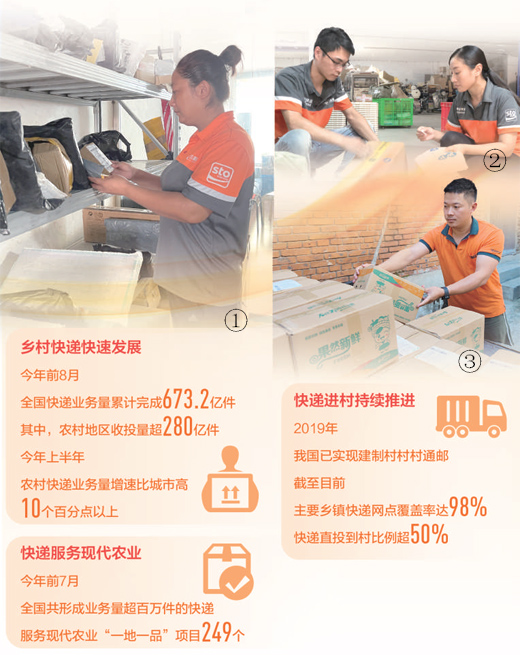Express delivery industry prospers in rural areas, brings benefits to local residents

① Zhang Jianfang checks parcels for delivery at an express delivery service station. (People’s Daily/Li Zong) ②Li Jia and her husband pack parcels for delivery at an express delivery service station. (People’s Daily/Wang Kaikai) ③Photo shows a deliveryman, Liu Chunlong, unloading parcels from a trunk. (People’s Daily/Wang Yongzhan)
At 8 a.m., Li Jia and her husband start their day by handling parcels at an e-commerce express service station run by them located in Meihua village, Gaocheng district of Shijiazhuang city, north China’s Hebei province. About one hour later, villagers can be seen coming to the station to claim their parcels. “Each day, about 1,000 parcels arrive at the village while as many as 10,000 parcels leave the village,” said Li.
Eight years ago, when the couple got a foot in the industry’s door, they had thought about giving up due to the sluggish business. What was worse, because there were no service stations near their village they had to go to the city instead, which is located 20 kilometers away, in order to have the commodities mailed.
In 2013, the couple opened a delivery service station that covered less than 5 square meters in space. The service station gradually became a place where local factories and individuals liked to have their parcels mailed. In 2015, the couple closed down their furniture factory and established a 1,000-square-meter express delivery station. Last year, they opened five branch stations, which altogether are able to serve 19 nearby villages.
In the January-August period of 2021, China’s delivery industry handled 67.32 billion parcels, with 28 billion parcels having been handled in rural areas. The parcels included farm produce bound for the urban market and industrial products to be sold in rural areas. These products were valued at 1.4 trillion yuan (about $215.87 billion). On a daily basis, China’s courier sector now handles more than 300 million parcels each day, with more than one third of parcels being delivered in rural areas.
In the past, courier companies were reluctant to infiltrate into rural areas because the business volumes were smaller and the logistics costs were high. However, currently more than 98 percent of townships have access to parcel delivery services, with the service network having been extended even further to reach more villages.
About 10 years ago, Zhang Jianfang opened a small express delivery service station in Pingguo, a county-level city in Baise, south China’s Guangxi Zhuang autonomous region. Nowadays, as an executive of the branch company of the Chinese courier giant STO Express in Pingguo, Zhang disclosed that her company now handles more than 20,000 parcels a day. With the delivery service covering the whole city, Zhang said she often has to deal with complaints from clients over issues such as damaged packages, saying the job is not as easy as it appears to be. She also said that the biggest bottleneck at present is a lack of talents, including deliverymen, technicians and managers, adding that she plans to pay more attention to cultivating talents for her company.
Thanks to express delivery services, rural products have entered more markets across the country. In 2020, China’s online retail sales of agricultural products reached 575 billion yuan. In the first seven months this year, of all the projects launched to boost the sales of locally grown agricultural products through the use of modern logistics networks, 249 projects saw a parcel handling volume of more than 1 million, with 45 among them having witnessed 10 million parcels being delivered.
Photos
Related Stories
- China's postal, express delivery sector sees rapid 8-year expansion
- Growing express delivery capacity helps unleash consumption potential in China
- China sees record express delivery volume in Jan.-May
- China's express delivery business almost doubles pre-pandemic level in May Day holiday
- Express delivery services gives a boost to China’s rural industries
- China's logistics potential behind 70 billion pieces of express delivery
Copyright © 2021 People's Daily Online. All Rights Reserved.










